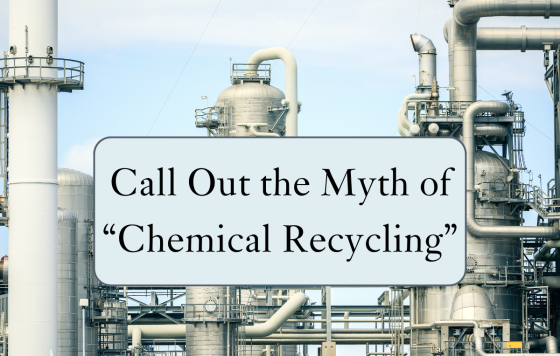
Yesterday morning, we gathered with Baltimore City residents, advocates, Council members, state delegates, and Mayor Young for the final signing of legislation we've been working for over the past six months: the Comprehensive Bag Reduction Act! This city legislation bans plastic checkout bags in Baltimore, and puts a 5-cent fee on paper and other bags to make up the extra cost of purchasing these bags on stores, and encourage the use of reusable bags. In the past several years, plastic bags have become increasingly difficult to recycle - for example, MOMS Organic Market stopped accepting plastic bags for recycling on January 1, and Baltimore City doesn't accept plastic bags in curbside recycling. This means that plastic bags usually get burned at the BRESCO incinerator, contributing to the formation of cancer-causing dioxins and other air pollution that impacts Baltimoreans' health. Banning plastic bags is a small step, but a significant one, to rethinking disposable plastic products and moving toward more sustainable alternatives overall - and will keep our streets, streams, and storm drains free of damaging plastic film. Find out more:
- watch our Livestream of the signing
- in the Baltimore Sun: "Baltimore will soon say bye to plastic bags at checkout. Here's what you need to know."
- in Patch: "Plastic bag ban signed by Baltimore mayor."
- on WJZ: "Plastic bag ban bill signed in Baltimore, retailers to charge 5 cents per bag in 2021."
We were disappointed, though, that this legislation was amended to remove an exemption on the fee for plastic bags for customers making purchases with SNAP, WIC, and similar programs. As we move toward a more sustainable future, we must make sure that the costs of doing so don't fall heaviest on the people least able to pay them. We'll be advocating for free distribution of reusable bags throughout the city, and as the state legislature considers banning plastic bags statewide, we'll be working to ensure the bill addresses potential inequitable impacts of the paper bag fee.
As Maryland's legislative session begins, we're shifting focus from plastic bags in Baltimore, to the state's waste stream overall. Maryland policies give a lot of artificial support to trash incineration, which pollutes our communities and soaks up public dollars, but don't provide enough of a mandate to help local communities make the shift to composting, source reduction, and other elements of zero waste. How can you help?
- Click here to stay up-to-date with our legislative efforts to move Maryland past trash incineration.
- If you're part of a community association, business, religious institution, or other organization, sign on to a letter demanding these changes.
- click here if you want to volunteer!



